Today, EGADE Business School launched, at its Monterrey site, EGADE U Week, its new update program for Tecnológico de Monterrey alumni, with the first edition focusing on Future Thinking for Transformational Leadership.
Ignacio de la Vega, Dean of EGADE Business School, who offered a welcome message as an “avatar professor” thanks to holographic projection technology, indicated that permanent updating guarantees currency and relevance for any professional.
“EGADE U Week joins Tecnológico de Monterrey’s transformation in offering the education every professional needs to be competitive in an environment of exponential change,” said the Dean.
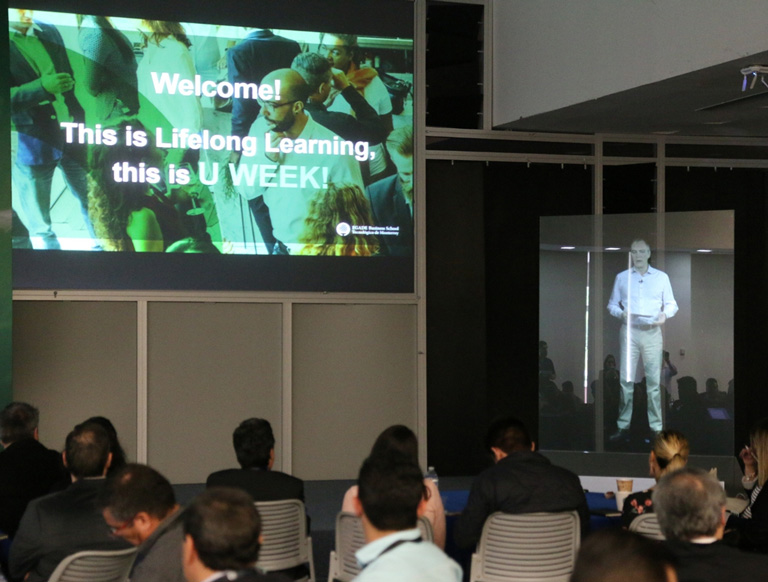
In the first of the program’s three days, activities got underway with a panel on “Future of Learning”, with the participation of Diego Lainez, Global Learning and Development Manager at Metalsa, and Julien Depauw, Director of the Master in Business Management at EGADE Business School.
“I firmly believe that learning is the skill that will enable us to resonate in the future. Companies now have to view themselves as organizations that also teach, that allow their collaborators to continue with their education,” Lainez commented.
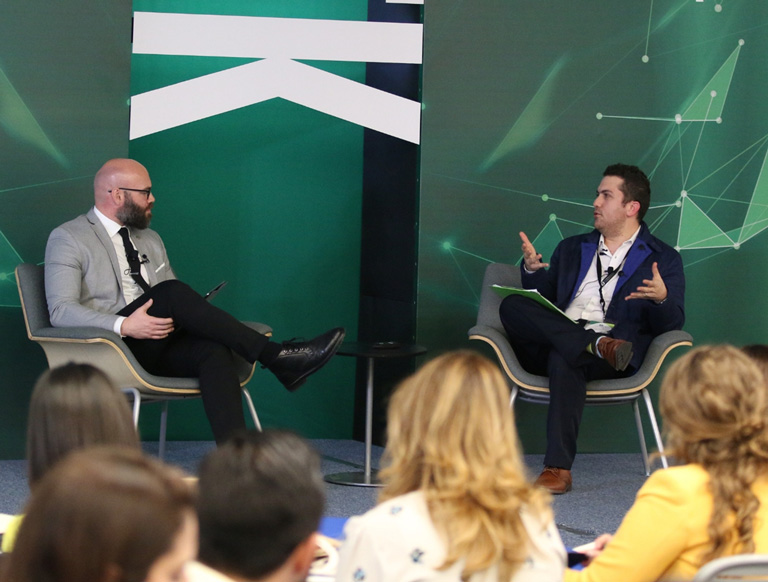
The next session was a discussion by EduTalks on the topic “Future of Work”, with the participation of Dean De la Vega and Pierre-Henri Blancher, Senior Manager of Human Capital and Leader of the Future of Work for Latin America at Deloitte México, who enumerated the disruptive factors of the future of work, including artificial intelligence, cognitive computing, robotics, jobs that are vulnerable to automation, demographic diversity and generational change.
“We’re experiencing a tsunami of data. We all generate millions of pieces of data every day through our social networks,” Blancher mentioned.
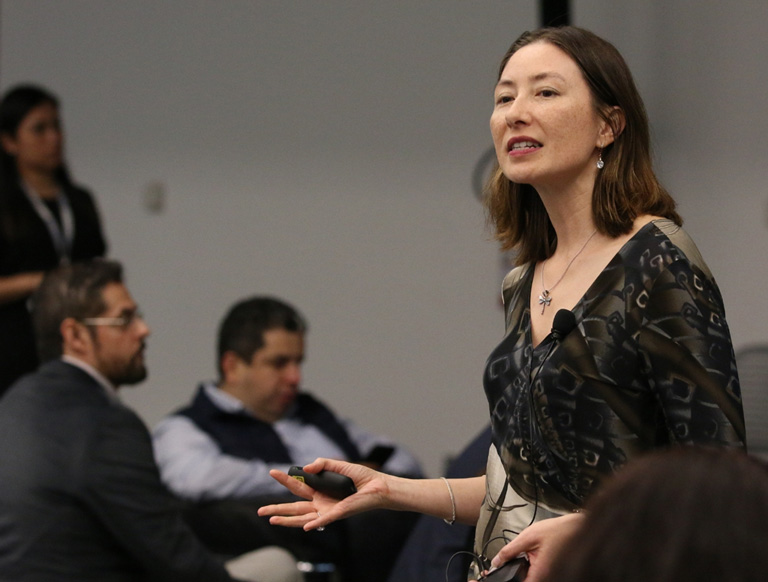
Tamara Carleton, CEO of the Innovation Leadership Group, gave the workshop “Future Thinking: Tools & Growth Strategies”, in which she shared his Foresight Framework model, composed of five phases that guide the planning and action of innovation within organizations.
The five phases of the model, Carleton explained, are Perspective, Opportunity, Solution, Equipment and Vision, which are designed to identify and evaluate new technologies, anticipate the current and emerging needs of future customers, and address complex problems in the fastest, creative and systematic possible.
"This helps to create the culture and environment for people to work together, collaborate and think about bigger ideas, and this makes it a sustainable process," said the instructor of the Stanford University Continuous Studies program.
In addition to the workshop, Carleton offered the “Data Driven Future in Mexico” conference.
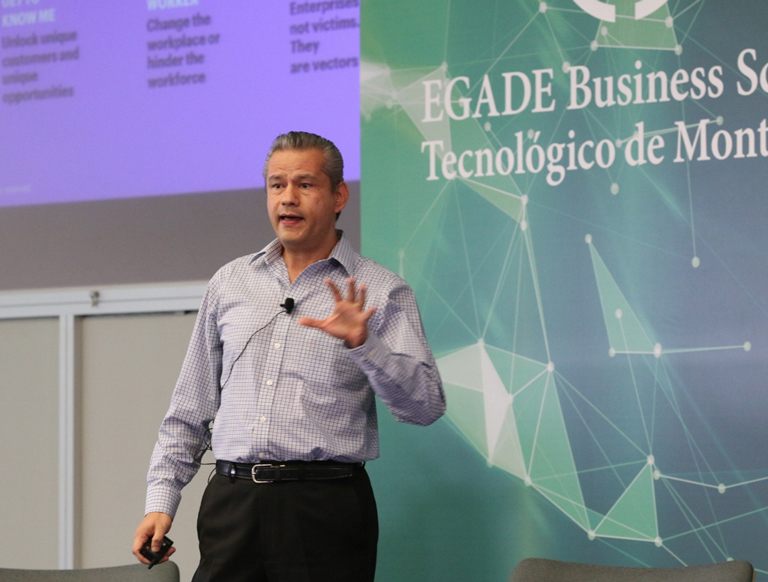
On the second day of activities, Luis Guevara, Leader of the Accenture Mexico Innovation Center, gave the “Technology Vision 2019” conference, in which he commented that the post-digital era is already breaking out and companies must be ready for what follow.
"83% of the executives we surveyed at Accenture agree that understanding consumer behavior around technology is essential to create customer loyalty; today we can customize and direct our efforts in a very specific way," said Guevara.
On the other hand, Adalberto González, Artificial Intelligence and Innovation Leader of Accenture Mexico, offered the conference “Applied innovation and disruptive business models”.
"As companies, we must learn to work with the new generations, who are the ones who understand and are shaping the technology," Gonzalez said.
Guevara and González, from Accenture Mexico, accompanied Gilberto Olavarrieta, Professor of Business Intelligence at EGADE Business School; Daniel Uriol, director of Digital Transformation at Tecnológico de Monterrey, and Daniela Cruz Azcoitia, co-founder of Pulpai, in the “Digital Transformation & Learning Experience” panel.
The second day ended with the participation of Joaquín Lozano Aguirre, director of Relations with Graduates of the Tecnológico de Monterrey, who offered the conference "Global Impact of Tec Alumni".
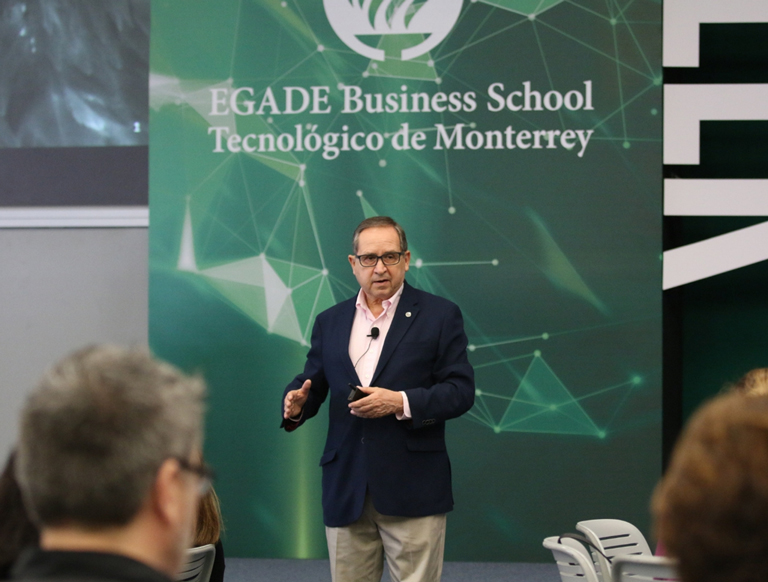
On the third and final day, Salvador Alva, president of the Tecnológico de Monterrey, delivered the conference “A possible Mexico”, based on the book he co-wrote with businessman José Antonio Fernández, in which they propose four differentiators for the country: thriving talent, committed and capable; a great place to live, safe and full of opportunities; a vibrant entrepreneurial spirit, and a business friendly ecosystem.
"There are plenty of leaders focused on problem-solving, but what is needed are inspiring leaders focused on what Mexico can be, focused on breaking paradigms," Alva said.
At the end of the event, the Design Thinking workshop was held, taught by Mario Saldaña, founding partner of Mindit, in which the attendees designed innovative proposals in teams to transform Mexico, which they presented in a team pitches session called “ Jam on Mexico's Transformation. ”
In its first edition, EGADE U Week focused on Future Thinking and how this model impacts different industries and supports the formation of leaders with a human approach capable of generating the transformation of industries and societies.
The next edition of EGADE U Week will take place in Mexico City in 2020.